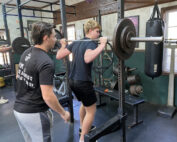“For He has said, ‘I will never leave you nor forsake you.’ So we can confidently say, ‘The Lord is my helper, I will not fear; what can man do to me?’” – Hebrews 13:5-6
Lions tore their bodies to pieces in the Colosseum, persecutors tortured them unto death, believers died in fierce battles of war, some lying wounded alone for hours before their last breath, others drowned in horrific situations, some, the Bible records, were sawn in two, and yet others died in agony from disease, pestilence, or violence. Some died from virus while gasping to breathe. What can you say about the extremity of God’s children taking their final breath in fearful circumstances?
As we enter Advent in a year such as 2020 we are ever reminded there are extremities in this life which terrify the souls of those who suffer in agony. The virus is an ever present fear. How do believers reconcile these circumstances with verses promising He will never leave us nor forsake us?
We know believers in the Lord Jesus Christ have suffered even unto death such horrible extremity, producing an earnest beseeching of God that they might be allowed to die comfortably in their sleep.
Is this a quandary of faith? Does Jesus speak such promises knowing some of His followers live and die under horrible extremity? Many of us who call Jesus Lord and Savior hang on the promise that He will never leave us nor forsake us. What does Jesus’ presence promise? Escape from pain? Or, the promise of His going through the extremity with us.
One of the problems with our earthly sight is we perceive a greater distance between this life and the next. We do not consider the split-second between this life and heaven. Therefore, we struggle to see how Jesus never forsakes His own even for a second. We understand only the extremity of this life and not so much the immediate sequel. We are not focused on our next breath in heaven because it lies in the realm of faith; yet, nevertheless, is quite real.
As I write this my daughter is undergoing an eight hour surgery to remove cancer and other potentially cancerous organs, including plastic surgery reconstruction, all at once. Serious surgery, to say the least. This was preceded by months of extremely toxic chemotherapy, loss of hair, strength, health, and comfort. It is surely the experience of the valley of the shadow of death as expressed in Psalm 23.
But even if God were to take her life in this surgery, which now is not the case, can I still say He did not leave her nor forsake her, even if her surgery had resulted in her death? Yes, I most certainly can!
Jesus sees the continuity from earth to heaven as continuous existence for those who are “in him.” His promises bridge the chasm of life here and life there. We may succumb to the valley of the shadow of death in this life, but the shadow of that valley never overcomes the sunlight of heaven or of the new heavens and new earth. You awake immediately beyond the valley, no matter how extreme, to the painless, tearless joy of celebration; and the realization that He never did leave nor forsake you.
Some will definitely experience the agony of the cross here and they have, but these believers are immediately in the presence of the Lord who never departs their side. “Even though I walk through the valley of the shadow of death, I will fear no evil, for you are with me; your rod and your staff, they comfort me.” His promises are true and certain altogether.
I can say this, never having yet experienced heaven, that I would far rather trust in the continuous presence of the Lord, relying by faith on His spoken promises, than to fall into the ditch of extremity alone.
“Hold thou thy cross before my closing eyes; shine through the gloom, and point me to the skies: heav’n’s morning breaks, and earth’s vain shadows flee: in life, in death, O Lord, abide with me.”
(5th verse of Henry Lyte’s hymn, “Abide with Me: Fast Falls the Eventide,” 1847)
Stay Updated
Sign up for our monthly newsletter and weekly devotional











